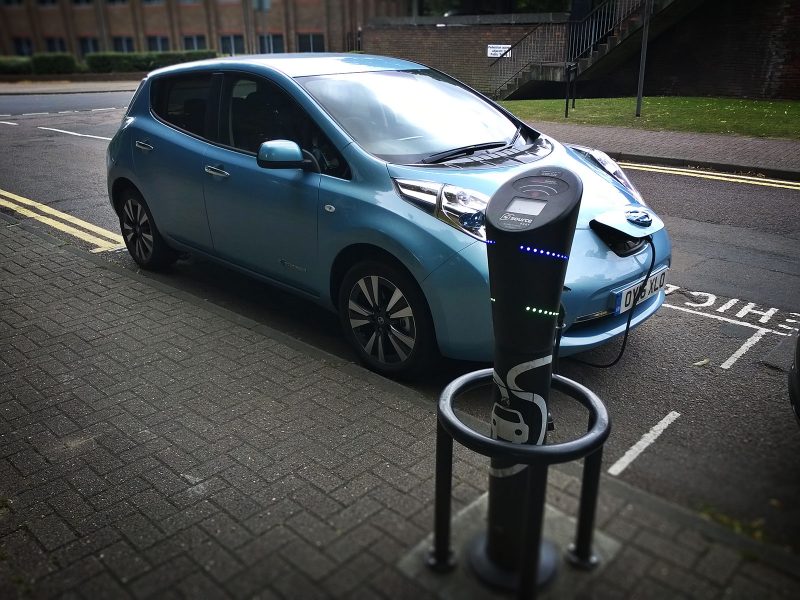For those who’ve followed my driving of the Nissan Leaf 30kWh Tekna, OY16XLO, you’ll know that I’ve enjoyed the delights of driving electrically and more often than not, for free. It’s one of the great pleasures of electric vehicle ownership and provides a superior sense of freedom, which is otherwise lost as you watch the pounds disappear from your fuel tank. However, there are a few gripes with electric car ownership that aren’t related to the car itself but that need addressing with urgency.
Up until now, I’ve been fortunate enough to only need the car on local/local area trips. This has meant I’ve taken full advantage of charging the Leaf for free at Waitrose and St Albans 3.5kW or 7kW charge points via the Source East scheme. They are plentiful whereas electric cars are not. I do, obviously, have a Source East card that makes this possible and convenient. But what if I didn’t, or wasn’t from the area?
Following the recent announcement that 15,000 parking spaces are now available free-of-charge to electric vehicles in Milton Keynes, I thought I’d look up where I can park my electric car in the city. I’m disappointed to report that a PDF form needs to be filled in with loads of unecessary information and even a copy of the car’s log book, all just to be issued with a sticker that says you have an electric car. I’m a bit perplexed by this. There are currently very few electric cars on the road and it doesn’t take a genius to recognise which are, or are not, electric. What’s more, you don’t need a log book to find out if a car is electric or not, as the registration number is more than adequate.
So I ended up paying for parking in an EV, in Milton Keynes, where there are 15,000 free EV parking spaces.
I appreciate the powers that be in MK are doing their best to encourage electric vehicles and that a certain amount of red tape is – sadly – inevitable, but the mere fact that we’ve been told parking an EV is free in MK and then finding out that it isn’t… unless you jump through lots of hoops is a bit daft. I don’t live in MK, don’t frequent the area and, of course, don’t own this particular electric car either and therefore don’t have access to the log book. I’m not the only one either, there are plenty of drivers who use cars but who don’t have access to the log book; for example hire cars. It seems like a poorly executed and needlessly complicated way to be able to park an EV for free. A suggestion would be to firstly put the form online rather than in PDF format and require only the number plate, which is more than enough to qualify whether a vehicle is an EV or not. On the other hand, if the powers that be are worried about the odd unscrupulous owner tying to disguise their Range Rover as an EV, a simple fine could be put in place to counter them – as already exists for those parking where they shouldn’t.
All this reminded me of another sore point for EVs. On my return from Milton Keynes, I thought I’d stop by at a rapid charger that I had used once in the past. I couldn’t remember what network it was on, so I wasn’t sure I’d be able to use it. Fortunately, I didn’t need it, but I wanted to use it. I couldn’t.
RFID card systems might work well in closed loops, like at private offices, but they don’t work well for a nationwide charging scheme. I appreciate things are still in their infancy, but it’s incredibly frustrating to arrive at a charge point having made the effort to get there only to discover you cannot use it for no other reason than you don’t have the right RFID card.
Yes, journey planning can avoid the issue but imagine if I had been a foreign driver visiting the UK in my EV and had needed rather than wanted to use the charge point. I would have been willing to pay for the electricity, but had no means of doing so and been needlessly stranded.
Ease-of-implementation rather than ease-of-use for the customer is behind the adoption of RFIDs and while plug-in vehicles are few and far between this is okay. And, as mentioned, there is a place for RFIDs to serve private networks like taxi ranks or at office blocks. For a nationwide public charging network this isn’t the case at all, but what are the alternative options?
First and foremost, mobile phone Apps are being turned to as a source of secure payment for charge points. This means you might not need to be an existing member of the network and can simply pay-as-you-go or quickly register online, if needs be. The only problem is many Apps are phone specific – Apple or Android – meaning those who prefer the inexpense of a so called “feature phone” are left bewildered by the assumption we all own expensive “smart phones”. What’s more, having a smart phone isn’t enough, as we’re also required to have a data tarrif. This might be commonplace, but it’s hardly guaranteed. Of course, Apps need not be phone specific and web Apps – a universal web-based software application – can be used instead. Indeed, Ecotricity is working on this at the moment for their Electric Highway.
Some say charge points should accept card-payments from Visa and Mastercard, as these are age-old standards that a vast majority of users will have access to and use regularly. This is perhaps the preferred option without requiring the reinvention of the wheel. However, would you really want to enter your pin number at a dark roadside away from the bright lights and relative safety of a forecourt? Would charge points need CCTV installed if card payments were on site? Perhaps contactless payment is the way to go, but again not everyone has or wants this.
To save upgrading expensive infrastructure with new card machines, perhaps a low-tech approach is better, for example installing a parking meter to pay for parking rather than charging, although the latter would be paid for indirectly.
Automatic number plate recognition (ANPR) is another possibility. More and more supermarkets employ this to monitor the to-ing and fro-ing of their evermore congested car parks. A monthly electric car utility style bill could then be sent to your home and this would take away the hassle of payment at the plug.
Whatever method is best, it’s fair to say the current methods employed leave a lot to be desired. They may have provided an adequate starting point for the electric revolution but they risk restricting uptake, as people understandably dislike the idea of not being able to travel freely around the country without first signing up to a millenia of charge networks in advance. It’s a serious problem that needs to be addressed and fast.




I feel for you. When the Leaf launched I planned to buy one. I did my homework and decided my only option for home charging was to have a charging postin my dedicated off road (uncovered) parking space.
I contacted a supplier/installed who gave me a price of £8000 and told me I would need planning permission from the council.
I applied and was refused. After appealing twice they finally admitted (or claimed), the reason was the intended charging point would be less than 10m to a road (which only feeds 6 houses and is not a through road)!!
Considering some points are installed on pavements, a few feet from a road, I was shocked with their excuse.
I gave up and bought a eco diesel and will look at a i3 REX in the future.
I used to think EVs would be mainstream in about 5 years, my guess is now 10-20. Due to red tape and stupid legislation.